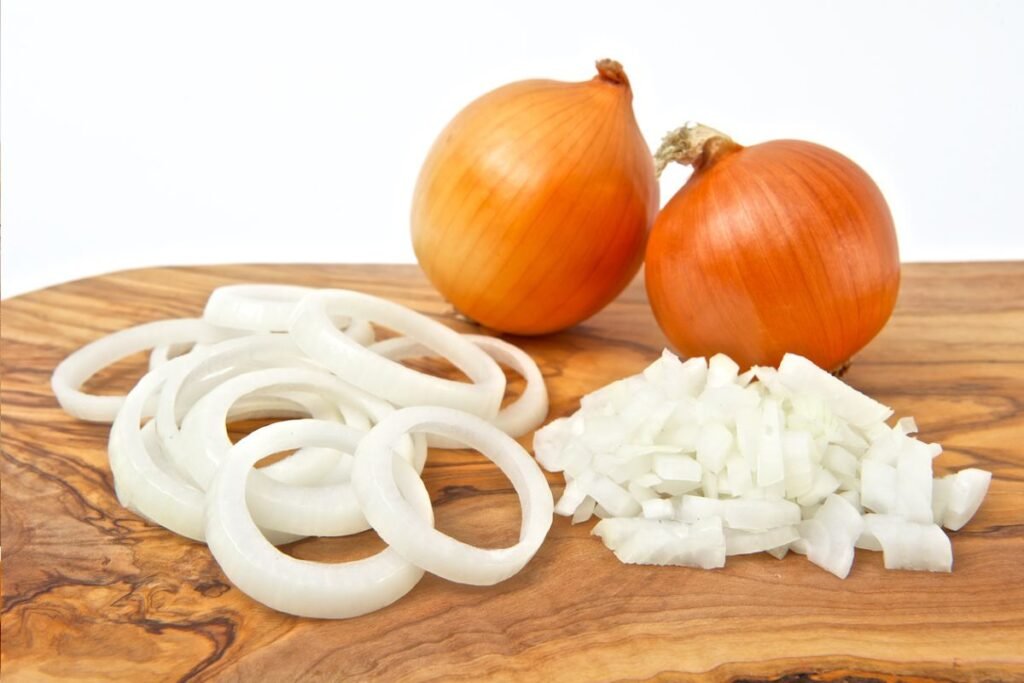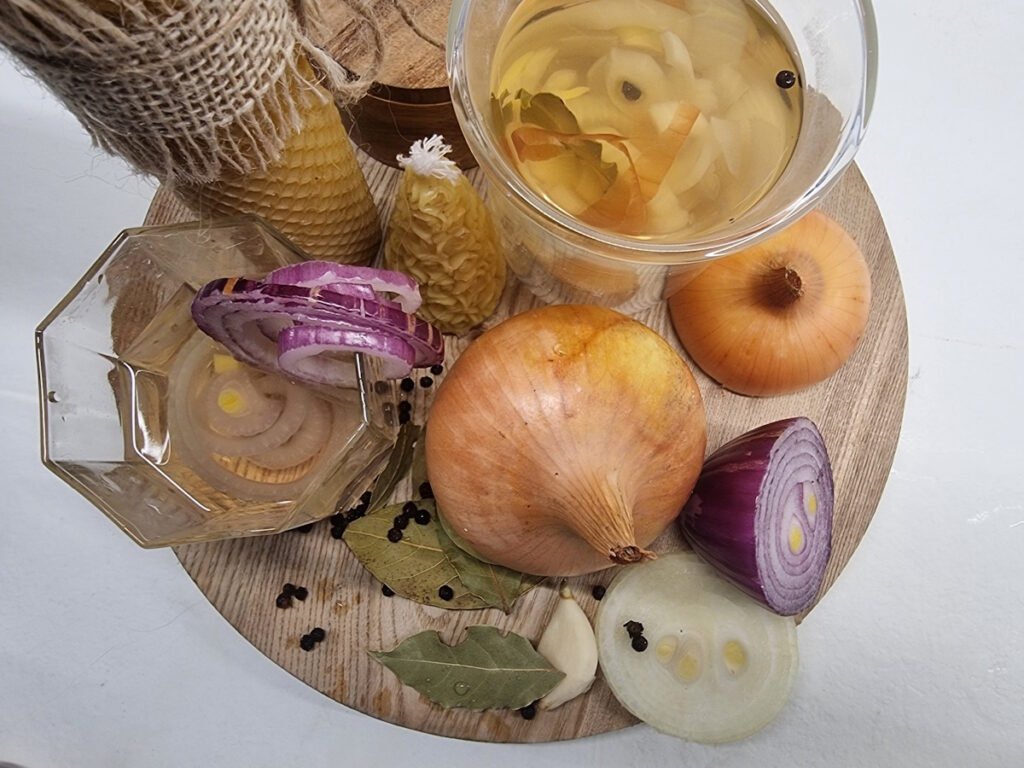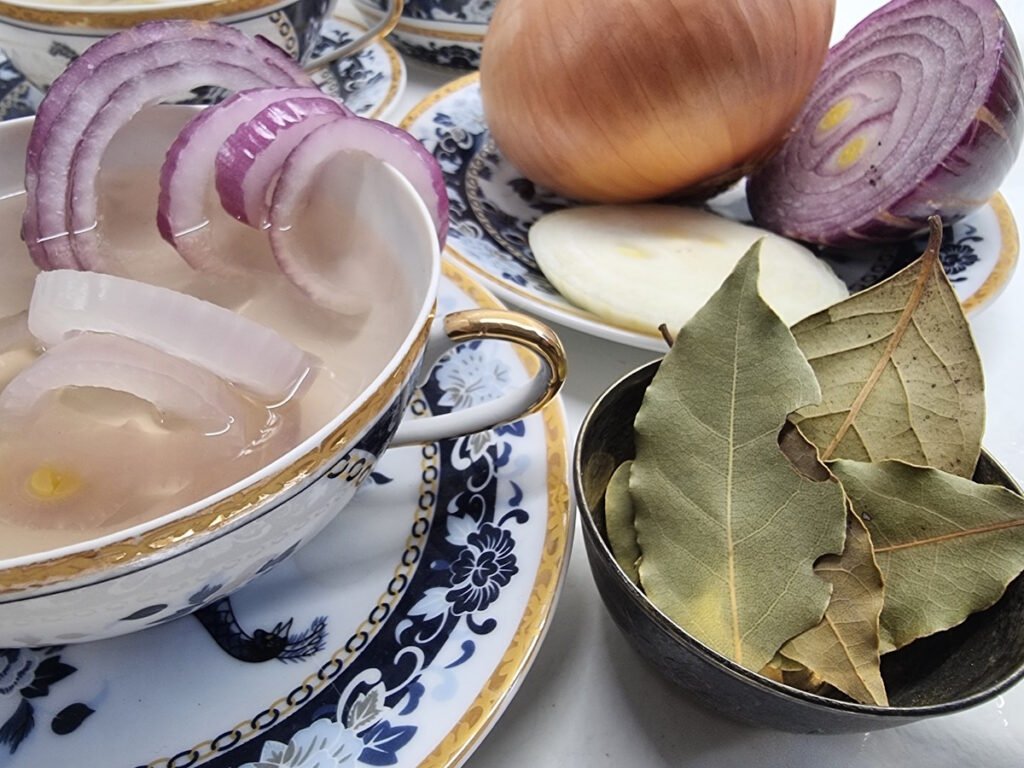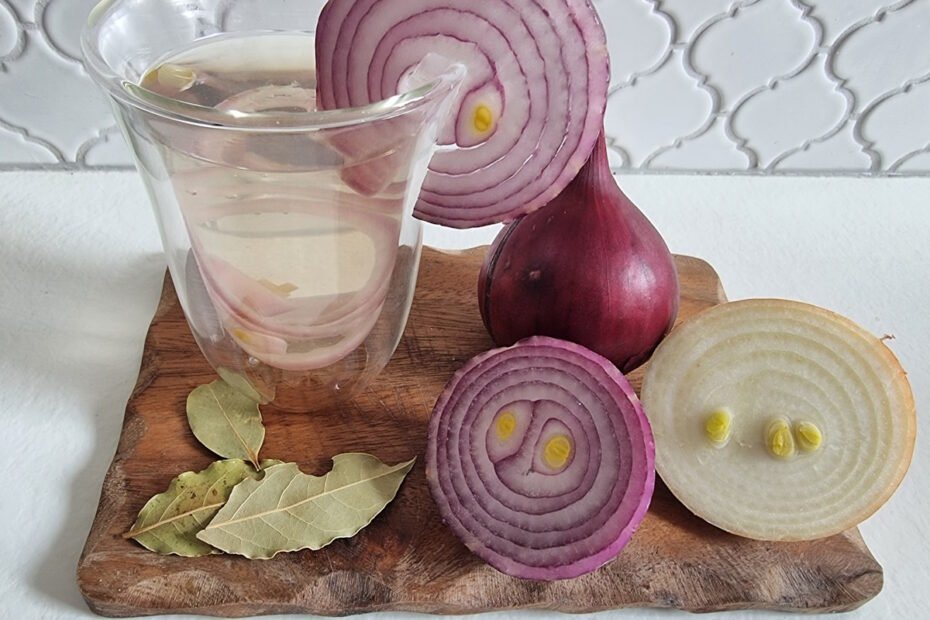When a nagging cough strikes during the season’s change period, we often look for various folk remedies to calm it down. If you don’t have any cough medicine nearby, there’s always an onion around the house, which means there’s also a healthy onion tea. And who says that this drink should only be consumed for cough episodes? The tea is rich in potent antioxidants that protect the heart, improve sleep, and make life easier for diabetes. This means one more cup of onion tea benefits your everyday life, boosting immunity and preventing illness. So, have you already made your onion tea?
About The Onions
The onion (Allium cepa) is a member of the Amaryllidaceae family we know it as a popular worldwide vegetable commonly used in cooking. As an ingredient, it is used in its entirety: both the leaves and the onion, as well as the shells, which are also used to make onion peel tea. The hollow, steep, elongated, greenish tubular leaves grow from the bulb. The onion head is, botanically, the underground part of the stem.
More recently, onion skins—the thin, golden, white, or red skin that covers onion heads—are also useful facilities in kitchens or homes. The plant is biennial or perennial, which means a sturdy stem grows the following year. The flowers are round, forming the umbel-shaped inflorescence.

What Are The Characteristics of Onions?
The onion is a cheap vegetable that contains valuable components for health. The compounds in onions have a variety of health benefits, including anti-cancer, anti-platelet, anti-asthmatic activity, and antimicrobial effects. Phytochemicals, anthocyanins, and at least 17 onion flavonoids can help reduce the risk of Parkinson’s disease, cardiovascular disease, and stroke. Quercetin, a highly valued substance in onions, has antioxidant properties that combat inflammatory conditions (cancer, diabetes, lowering blood pressure, UV radiation, and aging processes).
In addition, onions are an excellent source of vitamins B6, B9, and C. They are rich in potassium, manganese, and smaller amounts of other minerals. When eaten as a vegetable, it provides only 39 kcal/100 g and 1.7 g of fiber.
Onion Tea Benefits
Onion tea, like onions themselves, contains flavonoids, quercetin, vitamins, and minerals that can increase antioxidant levels in the blood. It is the substances that need to be put on a pedestal because they do all the work. A tea rich in these components helps prevent colds and coughs as the seasons change. More importantly, it can boost immunity and provide energy. Onion tea shows significant features in controlling hypertension and stress and preventing inflammation and the diseases it causes. But let’s get more specific below.

Onion Tea for Coughs
One of the most common uses of onion tea is an annoying, severe cough treatment. This tea can protect against these symptoms and related diseases by increasing the level of antioxidants in the blood and strengthening immunity. Onions contain potent antibacterial and anti-inflammatory compounds that help prevent colds, coughs, and flu. It can also help relieve respiratory discomfort.
Onions and Asthma — The Ultimate Enemies
In support of the claim that onions are great for coughs, their anti-asthmatic properties are to be credited. Because onions can relax the muscles in the trachea, asthma patients feel better sooner and can breathe easier while consuming this vegetable.
This is not a coincidence, as a 2016 study on rats with allergic asthma proved. The results showed that aqueous onion extract reduced cell infiltration and lung inflammation in rats with allergic asthma.
Regulates Blood Cholesterol Levels
Onions are rich in quercetin, which can help control blood cholesterol levels. It does this by stimulating the production of good cholesterol and lowering bad cholesterol in the body. This ensures good heart health, and you can achieve these results by drinking 1-2 cups of this drink daily.
Onion Tea Controls Blood Sugar Levels
Onion tea is also beneficial for diabetes. A small study in 2010 research on 84 people with type 1 or type 2 diabetes found that eating 100 g of raw red onions 4 hours later significantly reduced blood sugar levels and the risk of spikes. A 2020 study on diabetic rats fed a diet containing 5% dried onion powder for eight weeks showed lower blood sugar, triglyceride, and cholesterol levels. Its anti-inflammatory and antioxidant properties help to reduce the symptoms of diabetes.
Beneficial for The Digestive System
Onions are a decent source of inulin, which is beneficial for gut health. Drinking onion tea regularly will help maintain gut health and prevent ailments like indigestion, constipation, bloating, and other problems.
Onion Tea Benefits for Better Sleep
One cup of onion tea every day helps you sleep better. Onions contain the amino acid L-tryptophan, which is a natural sedative. It also helps reduce stress levels, which helps sleep better.

Helpful for The Heart and Blood Vessels
The many benefits of onion tea for the heart and blood vessels can be mentioned here. Flavonol and quercetin substances in onion tea help control blood pressure. Sulfur can be found in the tea, which helps to thin the blood and prevents blood clots from forming. Flavonoids and polyphenols act as antioxidants and help maintain healthy blood vessels by protecting the walls against oxidative damage, inflammation, and triglyceride accumulation. In this way, onion tea effectively reduces the problem of high cholesterol levels and poor circulation, preventing hypertension, heart attacks, and strokes.
Onions Against Cancer
Onions can reduce the risk of certain types of cancer, such as stomach, colon, and ovarian cancer. Several scientific studies have shown this. In one 2015 studies review, researchers gave meaningful conclusions. They said that people who eat the most onions were 22% less diagnosed with stomach cancer.
In a 2014 review of 16 studies involving a total of 13 333 people, researchers found that people who consumed the most onions had a 15% lower risk of colorectal cancer than those who consumed the least. In vitro studies suggest that the compound onionin A in onions may help to reduce the development of tumors and slow the spread of ovarian cancer.
Onion Tea Fights Germs
Numerous studies have shown that onions are effective against microbes such as Escherichia coli, Pseudomonas aeruginosa, Staphylococcus aureus, and Bacillus cereus—significant human pathogens. And recent research shows that onions can also tackle the scourges of the 21st century: Helicobacter pylori and Vibrio cholerae.

How to Prepare Onion Tea?
Once familiar with the immeasurable benefits of onion tea, prepare the ingredients and tools to make it. Although the simplest version of the tea can be made from onions alone, we offer you a recipe with additional ingredients to improve taste and immunity. You will need:
- one chopped onion
- 2-3 cloves of garlic
- one teaspoon honey
- 1-2 cups of water
- 1-2 bay leaves
- lemon juice (optional)
- cinnamon (optional)
Preparation:
- Put the water in a saucepan and bring it to a boil.
- Add the chopped onion, crushed garlic cloves, and bay leaves to the boiling water.
- Let everything boil for a while, then drain the pot.
- Strain the tea through a sieve and pour it into a cup.
- Add honey and cinnamon powder to taste. You can also add lemon juice for a richer flavor. If sweetness does not suit you, add a pinch of salt and pepper and use it as a broth.
For long-lasting effects (such as lowering blood sugar and cholesterol levels or controlling blood pressure), drink a cup daily for at least a while.

Side Effects of Onion Tea
However, the benefits of onion tea may not be enjoyed by everyone. Some people should avoid this tea or take a good look at the situation because of its undesirable adverse properties. Here are the side effects of onions and the tea made from them:
- Bad breath. The high sulfur content of onions leads to a pungent, unpleasant smell. The good news is that tea has much less odor than fresh onions.
- Significantly low blood sugar. In some cases, changes in sugar levels are not helpful. People with diabetes should check their blood sugar levels before consuming these vegetables and tea to make sure they do not drop too low.
- Gastrointestinal disturbances (stomach irritation, vomiting, nausea, and heartburn) if consumed in excessive quantities.
- Pregnant and lactating women should limit their intake of onions, as they often cause heartburn during this period.
- Onions can lower blood pressure. People who take blood pressure medications should be careful when taking them.
- Onions are incompatible with or interact with some medicines. For example, aspirin increases sensitivity to onions.
- Onion consumption reduces blood clotting because of its anticoagulant properties. Combining onions with anti-clotting drugs may increase the risk of bleeding and bruising. Onions should generally be avoided by those who have difficulty clotting their blood.
- People allergic to wheat and celery may also be allergic to onions.
Although we mention several harmful properties, we all know that onions are an extraordinary vegetable. If you have been using it successfully so far, do not stop. If you notice any adverse health effects or start taking certain medications, consult your doctor.
Sources:
https://girlswhoeat.com/recipes/drinks-recipes/immune-boosting-onion-tea/
https://www.livescience.com/45293-onion-nutrition.html
https://www.thehealthsite.com/fitness/diet/brew-some-onion-tea-a-cup-a-day
https://healthiersteps.com/13-health-benefits-of-onions/
Researches:
https://pubmed.ncbi.nlm.nih.gov/31893634/
https://www.ncbi.nlm.nih.gov/pmc/articles/PMC9322202/
https://pubmed.ncbi.nlm.nih.gov/21702293/
Associative photos from © Canva.

